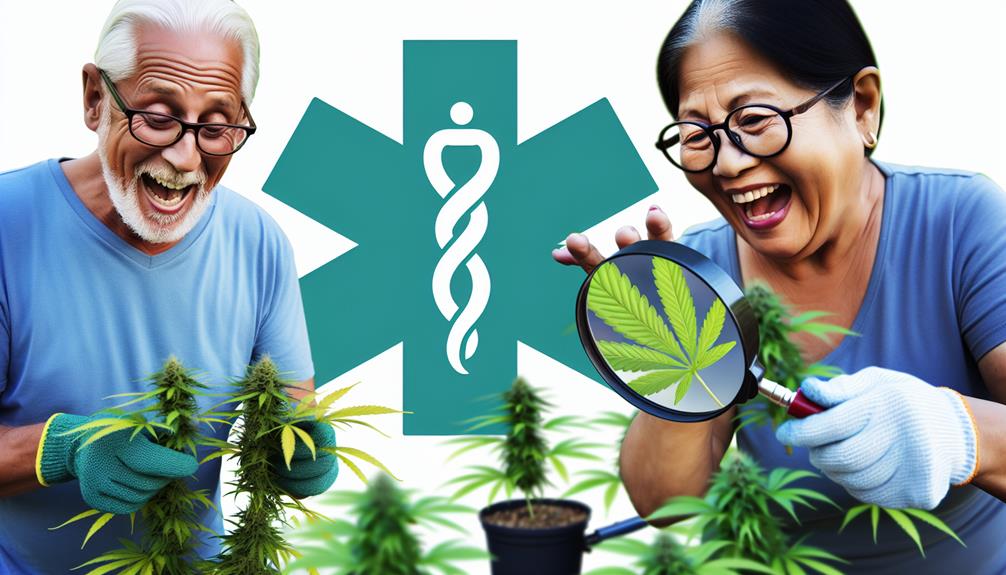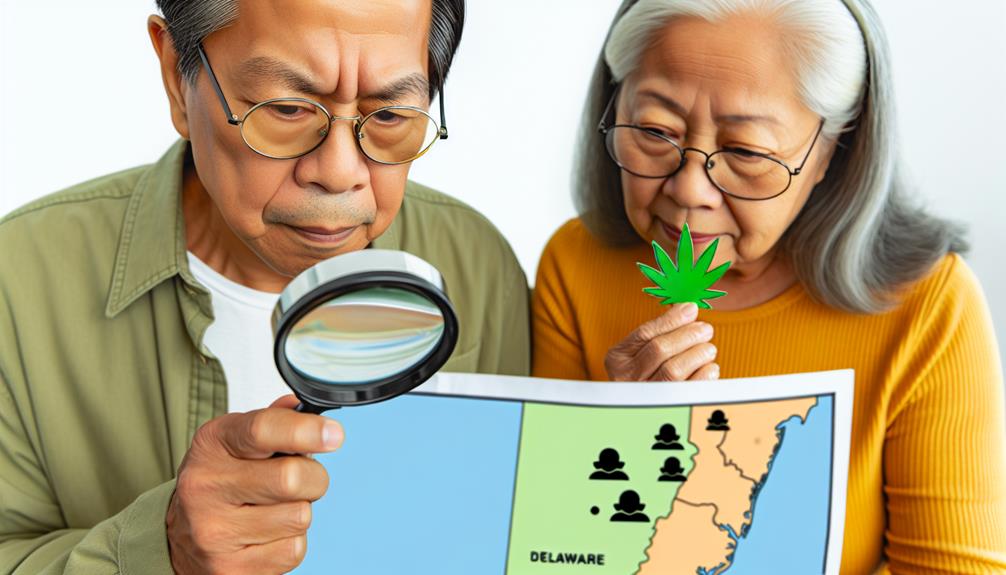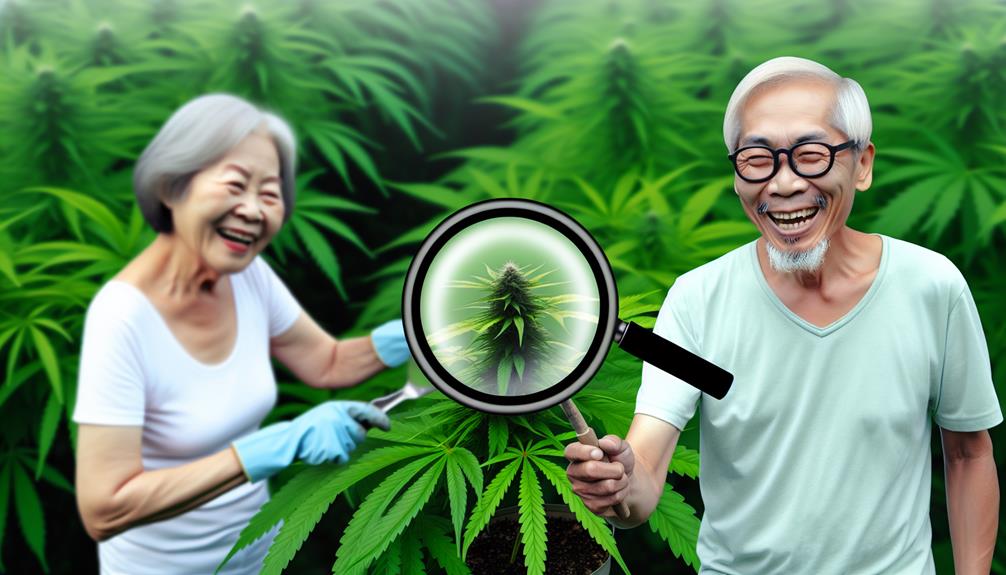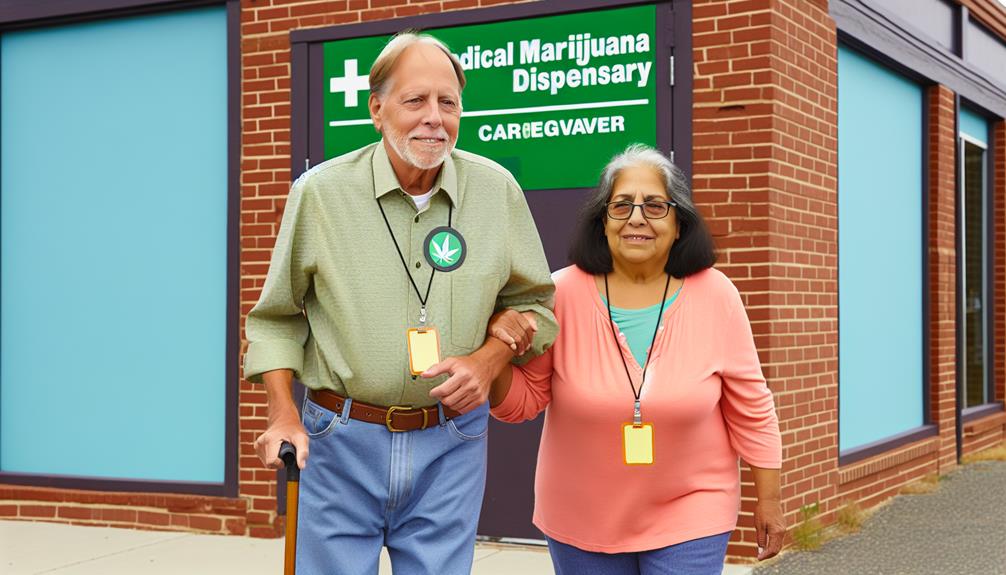Could Delaware’s recent expansion of medical marijuana access for seniors revolutionize the way we treat age-related health issues? This legislative change allows more qualifying conditions and eases the connection between seniors and registered healthcare providers, potentially reducing their reliance on traditional prescription medications. By fostering patient advocacy, Delaware’s seniors are now finding an alternative pathway to treat chronic pain and anxiety. However, this broadened access opens up a whole host of other questions and implications. Let’s explore the potential impacts, both positive and negative, that this decision might have on our healthcare system.
Understanding Medical Marijuana

In light of the growing popularity of medical marijuana, it’s important to understand what it entails. Medical marijuana fundamentally involves using the whole unprocessed marijuana plant or its basic extracts to treat symptoms of illness. It’s not just about getting high; many chemical compounds found in marijuana, known as cannabinoids, have medicinal effects.
Cannabinoid education is a significant part of understanding medical marijuana. It’s not just about knowing THC and CBD—the two most well-known cannabinoids—there are dozens of others each with unique benefits and potential side effects. That’s why it’s crucial to have a detailed conversation with a healthcare provider or pharmacist knowledgeable in this field who can guide you about the best way to use medical marijuana considering your specific needs and health conditions.
Patient experiences play an important role in understanding medical marijuana too. By listening to their stories you’ll get a clearer picture of how medical marijuana can help alleviate symptoms improve quality of life and even treat certain conditions.
But remember, everyone’s experience is different. What works for one person might not work for you. Hence, it’s important to approach this treatment with an open mind and careful consideration.
Delaware’s Previous Cannabis Laws

Often overlooked, Delaware’s previous cannabis laws laid a unique foundation for the state’s current policies. They were some of the earliest in the country to recognize the medicinal benefits of cannabis. This piece of cannabis history is crucial to understand the current landscape.
As you delve deeper into the state’s past, you’ll find that legal challenges were common. In 2011, the Delaware Medical Marijuana Act (DMMA) was passed allowing qualifying patients to use and possess up to six ounces of medical cannabis. However, access to dispensaries was limited and personal cultivation was prohibited creating significant barriers for many patients.
In 2015, the state attempted to address these issues by launching its first medical cannabis compassion center but regulatory hurdles kept many away. It wasn’t until 2016 that the state decriminalized possession of small amounts of cannabis reducing penalties for non-medical use.
These laws while progressive for their time still left many patients especially seniors struggling to access the relief they needed.
Now, with its decision to expand access, Delaware shows a continued commitment to refine their approach demonstrating a deep understanding of both challenges and potential benefits associated with medical cannabis.
Why Expanding Access Matters

While the initial laws set a progressive tone, they didn’t fully address the needs of all patients—particularly seniors. You see, expanding medical marijuana access goes beyond policy—it’s about patient empowerment and social equity.
Here’s why it matters:
- It broadens treatment options: Patients especially seniors with multiple health issues need a wider range of treatment options.
- It supports social equity: Expanding access can help rectify disparities in healthcare that often impact older adults.
- It reinforces patient autonomy: Seniors should have the right to choose what goes into their bodies and how they manage their health.
- It promotes financial relief: Medical marijuana can be a cost-effective alternative for seniors on fixed incomes.
- It fosters inclusivity: When laws cater to all demographics it sends a message of recognition and respect.
The expansion of medical marijuana access in Delaware shows a commitment to addressing the unique needs of seniors and it’s a step in the right direction.
New Amendments in Legislation

Delaware’s progressive stance on medical marijuana continues to evolve with new amendments in legislation. These legislative changes are an indication of the state’s commitment to patient advocacy particularly for seniors who can benefit from this natural remedy.
Historically, Delaware’s medical marijuana laws were restrictive limiting access to a narrow set of patients. However, recent amendments have expanded these parameters paving the way for more seniors to avail of this treatment option.
This is a significant transformation that you as a caregiver or health care provider should be aware of.
Moreover, these changes foster an inclusive environment for all patients not just seniors. They also reflect the growing recognition of medical marijuana as a viable alternative to traditional prescription drugs especially for conditions prevalent in the elderly population like chronic pain glaucoma and cancer.
How Seniors Can Get Access

With the new legislative amendments you might be wondering how seniors can now access medical marijuana in Delaware. The expanded access revolves around clear guidelines for senior eligibility and a straightforward application process.
To help you better understand here’s a breakdown of the process:
- Determine Eligibility: Seniors must have a qualifying condition as recognized by the state. Conditions often include chronic pain severe nausea seizures or persistent muscle spasms.
- Find a Recommending Physician: The doctor must be registered with the Delaware Medical Marijuana Program.
- Obtain a Written Certification: The recommending physician needs to provide written confirmation of diagnosis and belief that medical marijuana will help alleviate symptoms.
- Complete Application: Submit application online or via mail with necessary documentation and application fee.
- Await Approval: If approved the medical marijuana card will be mailed to the address provided in the application.
It’s important to note that medical marijuana isn’t for everyone. Always consult with a healthcare provider to determine if this is a suitable treatment option.
In Delaware, the path to access has been made smoother for seniors giving them an additional avenue for potential relief.
Potential Health Benefits for Seniors

Benefiting from recent legislative changes seniors in Delaware may discover a host of potential health benefits by using medical marijuana. It’s not just about symptom management but also about enhancing quality of life in your golden years.
For starters you may find significant pain relief. Chronic pain can be debilitating but medical marijuana has been shown to be a viable alternative for pain management. Additionally it could help control inflammation which is a root cause of many age-related diseases.
Beyond physical discomfort anxiety reduction is another potential benefit. As you navigate complexities of aging medical marijuana might offer calming effect fostering sense of peace.
Appetite stimulation is another significant advantage. Some seniors struggle with maintaining healthy appetite and medical marijuana could stimulate your desire to eat ensuring you get necessary nutrients to stay strong.
Sleep improvement is another potential benefit. If you’re struggling with insomnia or irregular sleep patterns, medical marijuana might help you find more restful night’s sleep.
Furthermore some studies suggest that medical marijuana could offer cognitive support aiding in memory retention and mental agility.
Mitigating Concerns and Misconceptions

Despite numerous potential health benefits there are valid concerns and misconceptions surrounding medical marijuana use among seniors.
These misconceptions often stem from outdated stereotypes and misinformation influencing senior perceptions and creating unnecessary fear.
To mitigate these concerns we need to debunk myths and present facts:
- Myth 1: Medical marijuana is addictive. In fact when used as prescribed it’s less likely to cause dependency than some prescribed medications.
- Myth 2: It’s harmful to lungs. Actually it’s typically consumed in forms that don’t involve smoking like oils or edibles.
- Myth 3: It impairs memory. Recent studies show that medical marijuana can in some cases help slow cognitive decline.
- Myth 4: It’s illegal. While federal law is complex medical marijuana is legal in Delaware and many other states.
- Myth 5: It’s difficult to obtain. In reality Delaware has expanded access making it easier for seniors to receive treatment.
The Role of Caregivers

In the domain of medical marijuana use among seniors caregivers play an indispensable role. As a caregiver you’re the front-line defense ensuring proper administration of this treatment while balancing other caregiver responsibilities. You’re tasked with understanding intricacies of medical marijuana its dosage and potential side effects.
Emotional support is a key aspect of your role. Seniors might feel apprehensive about this treatment considering stigma associated with marijuana use. Your job is to provide reassurance educate them about benefits and help them navigate societal misconceptions.
Communicating with healthcare professionals is another vital responsibility. You must ensure that senior’s healthcare team is informed about their medical marijuana use to prevent potential drug interactions.
Lastly you’re responsible for monitoring senior’s response to treatment. This involves noting any changes in health mood or behavior that could indicate adverse reactions or beneficial effects.
Impact on Delaware’s Healthcare System

The legalization of medical marijuana in Delaware has undeniably placed significant impact on state’s healthcare system prompting key adjustments in healthcare costs and patient outcomes.
Here’s a snapshot of changes:
- Healthcare costs have been positively influenced. With seniors now having access to medical marijuana they’ve reduced reliance on expensive prescription drugs.
- Patient outcomes have improved too. Seniors are reporting better pain management leading to increased quality of life.
- A shift in healthcare strategies has occurred as well. Medical practitioners are incorporating marijuana into treatment plans.
- Medical marijuana has helped reduce hospital readmissions. Improved symptom control means fewer emergency room visits.
- Finally there’s been a surge in patient autonomy. Seniors can now take more control over their health management.
As the state continues to navigate this new landscape it’s crucial to remember that you as healthcare providers play an important role in shaping Delaware’s healthcare future.
Your commitment to serving others coupled with understanding of these changes will ensure that Delaware’s seniors continue to receive care they need in rapidly evolving healthcare environment.
Future Predictions for Cannabis Access

As we look toward the future it’s clear that landscape of cannabis access in Delaware will continue to evolve. The wheels of change are already in motion and cannabis legalization trends suggest this change will only accelerate.
You’ll likely see increased accessibility for seniors driven by senior health advocacy groups who recognize potential benefits of cannabis for various medical conditions. As you contribute to these efforts remember your actions can make significant difference in lives of seniors.
Expect more dispensaries to open reducing distance seniors have to travel to access cannabis. As you support these measures you’ll help make medical marijuana more accessible especially for those with mobility issues.
Also anticipate changes in legislation. Current cannabis legalization trends indicate move towards more inclusive laws and Delaware is likely follow suit. As you engage in advocacy or policy-making your efforts could contribute to these changes.
Conclusion
You’ve seen how Delaware’s new law makes medical marijuana more accessible for seniors. Imagine Martha a 70-year-old suffering from chronic pain now finding relief through this alternative treatment. This could be a game-changer for many like her reducing reliance on traditional medications and improving quality of life. With the state paving the way it’s an exciting time for patient advocacy. Watch this space as impact on healthcare unfolds and more states potentially follow suit.
If you’re curious to learn more about how medical marijuana can make difference I warmly invite you to visit Cannabis Docs of Delaware. Our team is here to help you navigate this exciting new chapter in healthcare. Feel free to give us a call at (855) 420-6797. We’d love to chat and answer any questions you might have!
The post Delaware Expands Medical Marijuana Access for Seniors appeared first on Delaware Cannabis Docs.
source https://delawarecannabisdocs.com/delaware-expands-medical-marijuana-access-for-seniors/

No comments:
Post a Comment